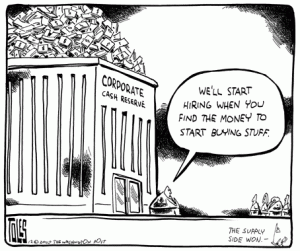A major re-redistribution of wealth has taken place in the United States over the past 40 years, as the share of the annual income going to the wealthiest one percent has increased  from less than 10% to more than 20%, while middle-class wages flat-lined. One way to deal with this growing inequality of wealth is to engineer a reversal of this re-redistribution.
from less than 10% to more than 20%, while middle-class wages flat-lined. One way to deal with this growing inequality of wealth is to engineer a reversal of this re-redistribution.
One vehicle for creating such a re-redistribution is the Earned Income Tax Credit, or EITC, which provides additional income to low-wage workers. Ronald Reagan once called the EITC the best anti-poverty device he knew of. Since early 2014, some Republican politicians have renewed a call for this remedy, and President Obama has included it in his proposed FY 2015 budget. Senate Budget Chair Patty Murray (D-WA) introduced legislation on March 26, 2014, to expand the EITC for workers without children.
January 8, 2014, marked the 50th anniversary of President Lyndon Johnson’s declaration in 1964 of a war on poverty. A segment of the PBS NewsHour on that date offered a historical review of our current poverty dilemma, where, due to offshoring and automation, there is a shortage of jobs, and many jobs that remain are low-paying.
The program contained a panel which included Glenn Hubbard, former chairman of the Council of Economic Advisers under President George W. Bush, who advocated for the EITC four times during the broadcast segment. Hubbard is now dean of Columbia University’s Graduate School of Business. He is also Visiting Scholar at the extremely conservative American Enterprise Institute, and he served as economic advisor to the 2012 presidential campaign of Mitt Romney.
Hubbard’s straightforward assessment included a prescription to support today’s working families: “Well, I think the war on poverty has had some success… To me, the real issue is, could we have done better still? And I think the answer is an obvious yes, that we have done well on the safety net part, but not well by helping people achieve success in America. A better example of that are things like the Earned Income Tax Credit that reward work. To help provide jobs and rewarding work, that’s really the best war on poverty.”
Also on January 8, 2014, conservative Senator Marco Rubio’s speech on poverty, saying, “Our modern day economy has wiped out many of the low-skill jobs that once provided millions with a middle class living. Those that have not been outsourced or replaced by technology pay wages that fail to keep pace with the cost of living. And even many of the middle-skilled white- and blue-collar jobs have also been lost to automation or shipped overseas.
“….We should pursue reforms that encourage and reward work. That’s why I am developing legislation to replace the Earned Income Tax Credit with a [monthly] federal wage enhancement for qualifying low-wage jobs. This would allow an unemployed individual to take a job that pays, say, $18,000 a year – which on its own is not enough to make ends meet – but then receive a federal enhancement to make the job a more enticing alternative to collecting unemployment insurance.”
On January 28, 2014, President Obama reached out to Sen. Rubio during his State of the Union address, saying, “There are other steps we can take to help families make ends meet, and few are more effective at reducing inequality and helping families pull themselves up through hard work than the Earned Income Tax Credit. Right now, it helps about half of all parents at some point. But I agree with Republicans like Senator Rubio that it doesn’t do enough for single workers who don’t have kids. So let’s work together to strengthen the credit, reward work, and help more Americans get ahead.”
Obama’s assertive budget for Fiscal Year 2015 includes expansion of the Earned Income Tax Credit for childless workers, helping more than 13 million, but it has received a cold shoulder from Republicans because of needed tax increases. This segment of the PBS NewsHour demonstrates the divide – but also suggests the possibility to come together to solve our serious, structural economic problem.
The Earned Income Tax Credit is not a pie-in-the-sky proposal. It is at the heart of the FY 2016 budget proposed by the Congressional Progressive Caucus, is endorsed by billionaire Warren Buffett, and it is in line with public opinion. A recent Gallup poll finds that 63 percent of Americans believe that the current distribution of wealth is unfair.
The EITC avoids several negative aspects of relying solely on increasing the minimum wage. Combined with some form of job sharing, the EITC could be a most powerful tool in reconstituting the middle class.
Paid for by the Baker County Democratic Central Committee,
and not authorized by any candidate or candidate’s committee.